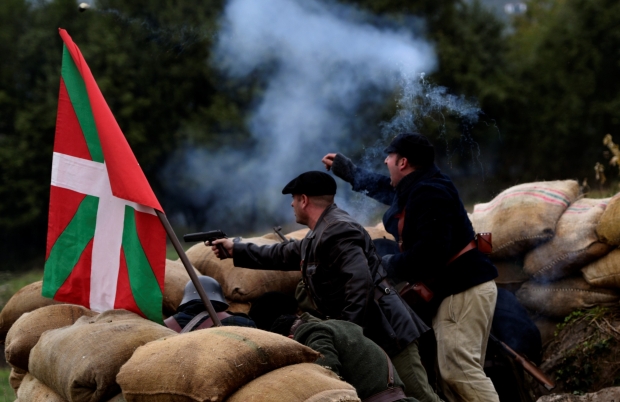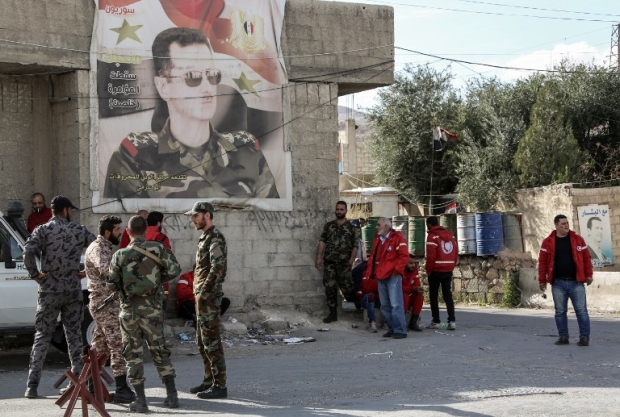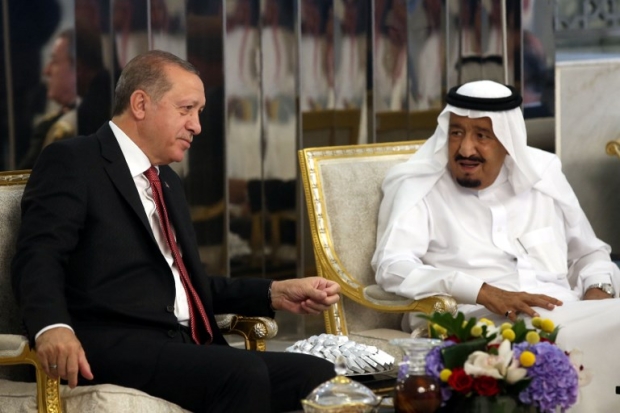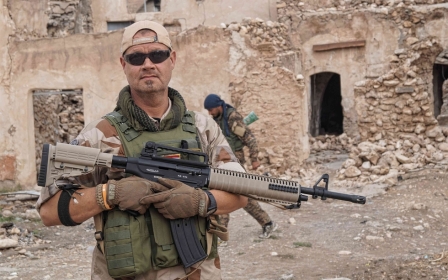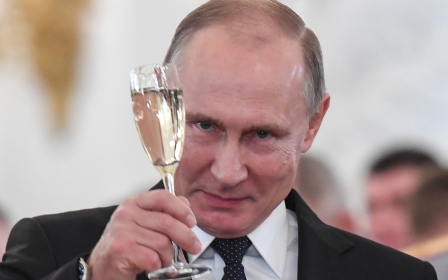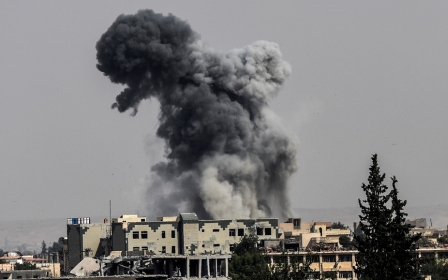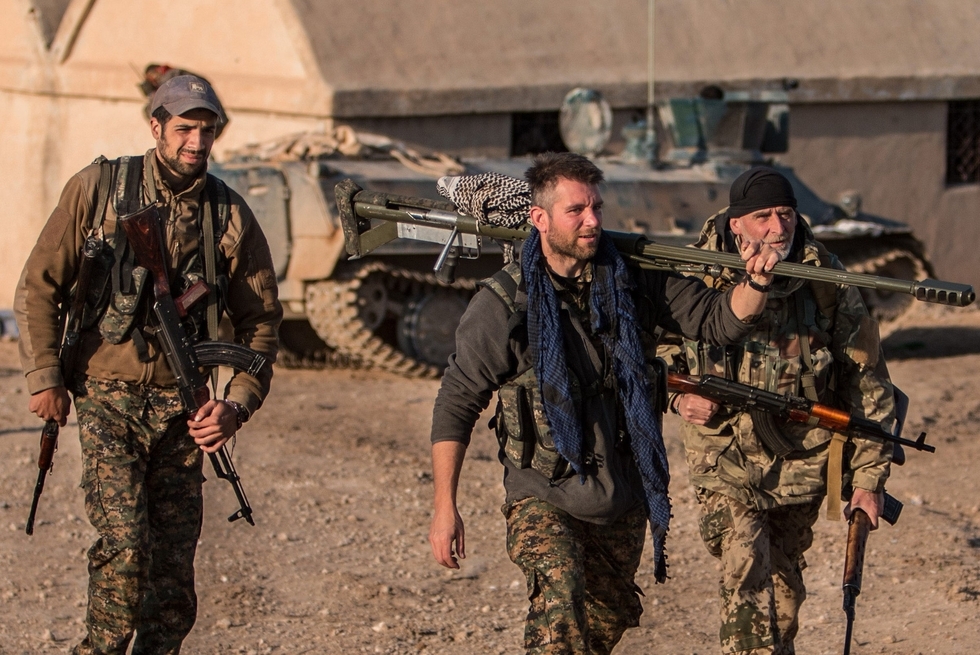
What the 1930s can teach us about Syria and our brutal world order
"We are in a labyrinth of utter madness," Leon Sedov, son of Trotsky, told Victor Serge in Paris before his premature and suspicious death in 1938, possibly by poisoning.
There are few witnesses to the tragic horror of Europe in the late 1930s, as fascism and counter-revolution crushed hope across the continent, like Serge. The Belgian anarcho-communist writer gave testimony to the whole arc of revolution and defeat from 1917 to 1940 in his magnificent memoir, which brings back to life a whole generation lost to fascism and Stalinism in that era.
As we watch the Kurdish YPG forces in northern Syria battling the Turks and their retooled militant allies trying to extinguish the Rojava revolution, it is hard not to draw a direct parallel to the tragedy of Spain's civil war and hope that the outcome is not a carbon copy of 80 years ago.
Rojava, the confederation in northern Syria led by the PYD party, is an experiment in democratic, feminist politics in stark contrast to the authoritarian states and sectarian armed groups dominating regional battlefields. It was the lead force fighting the Islamic State in northern Syria.
Messy and poisonous politics
For the modern Marxist-Leninists and anarchists who have volunteered to fight in Syria on the side of Kurdish forces, the parallels with Spain are clear, and they are duty-bound to fight to the death against the forces of Islamo-fascism. Spain's revolutionaries were armed by the Soviet Union. Today’s Kurdish forces have taken arms from the United States. In each case, it is the right of all those struggling for liberation to make alliances as they need.
This week 80 years ago, Barcelona was bombed by the Italian and German airforce, killing 1200 people and wounding 2,000.
The current bloody morass of Syria is the epicentre of our own era's counter-revolution, with the Kurds making a last stand, apparently without a single international state ally. In Spain, the Trotskyist and anarchist comrades of Serge were crushed in a pincer movement of Franco-fascism on the one side and Stalinist agents on the other.
Syria has seen the most intense misinformation and propaganda war of any recent conflict, and possibly of any conflict ever, and it is fought daily on social media
This is where, like Syria today, the politics become messy and poisonous. For some on the left, Syria is a straightforward anti-imperialist fight, with Syrian President Bashar al-Assad and Russia facing off against the forces of imperialism in the cities of Aleppo and Eastern Ghouta.
The US, Turkey, Saudi Arabia and their allies have backed so-called rebels - who, the argument goes, are in fact all foreign-backed mercenaries.
There is a small army of pro-Assad journalists and campaigners who see a simple struggle of Syrian sovereignty versus the merciless forces of western-backed terrorism. Terrorism, the favourite buzzword of US neocons a decade ago, is now on the lips of anti-imperialists. They have effectively countered much western pro-rebel coverage of the war, leading to a deficit of trust among readers.
Terrorism and alleged sympathy for it is, today, the main meme for defining one's enemies in the Middle East, be it in Syria, Turkey, Israel or Egypt. Of course, there are real terrorists, but the greatest form of terror in the modern world, as in the past, is that committed by states in peace and war.
False terrorism charges
Terrorism was, of course, the primary charge laid against the alleged enemies of Stalin's regime in the 1930s; they were all allies of foreign powers (such as Britain, France, the US and Japan), and many leading figures of the revolution, as well as thousands of lesser-known victims, confessed to these made-up charges and went to their deaths.
False charges of supporting terrorism are likewise de rigueur in Turkey today, sending unlikely victims, such as writers Ahmet and Mehmet Altan, to prison for life.
In the modern Middle East, the 2011 uprisings are themselves hugely contested areas in which at least two, if not more, main narratives of revolution and counter-revolution exist.
For some, the entire wave of uprisings that began in Tunisia in late 2010 was an orchestrated domino of "colour revolutions" planned by a nefarious US-Israeli strategy to reorder the Middle East. This conspiracy is so large that it includes everyone from the Muslim Brotherhood, to Egyptian leftists, to al-Qaeda, to the Islamic State, to the secularist-anarchist Rojava Kurds.
To embrace such a narrative, you must believe that the CIA and Mossad are genuinely all-powerful puppet-masters, and all other political groups and classes of actors are malleable marionettes without agency.
From another perspective, shared by Islamist activists and some liberals, the revolutions of Egypt, Libya, Tunisia, Syria and Yemen were genuine, mass-movement affairs, mostly destroyed by a combination of the Gulf states and Russia, with Western complicity thrown in. The Saudis and the United Arab Emirates brought down or undermined the revolutions of Egypt, Tunisia and Libya by backing military strongmen and deep-state forces to prevent a political renaissance.
In Syria, Assad, backed by the Iranians and the Russians, destroyed the popular uprising, but rebel forces fought on valiantly, with some help from Turkey, Saudi Arabia and the US coalition. However, the allies of this revolution were insufficiently committed to see the project through. Similarly, in Yemen, Saudi Arabia played a bad hand by backing a useless puppet, Abd Rabbuh Mansour Hadi, and then bombing the country into oblivion.
Opportunities for intervention amid chaos
In a polarised environment, it is tempting to take sides and let the facts fit the narrative. The reality is more complex, since events are the result of the actions of powerful political forces within a system of dysfunctional globalised capitalism. The uprisings were a clear threat to the existing order and had to be crushed, but they were also opportunities for intervention amid the chaos.
Certainly, Recep Tayyip Erdogan's neo-Ottoman regime, along with the UAE and the Saudis, were never on the side of progress, and are in fact in the vanguard of today's counter-revolution, along with Israel and Donald Trump's United States. Russia's Vladimir Putin appears to want to turn the world back to 1980. All are engaged in a war for power and profit.
In Syria, both Russian and US bombs kill thousands of civilians, while Assad's forces and, to a lesser extent, the "rebels" kill many more. Any sane person with an ounce of humanity wants this war to end - but when the actors involved are so invested in victory (in the case of Assad, Putin and Iran) or denying that victory (in the case of Islamist fighters and their foreign backers), too much blood and treasure has been spilled to stop now.
In the 1930s, the revolution and counter-revolution were fought on European soil, and in Serge's account, the game effectively ended with the Stalin purges and the fascist victory in Spain. History, of course, rarely conforms to a predicted course – the war that followed defeated fascism, but only at an unimaginable cost.
Are we on the verge of a larger war?
Is 2018 a pretty good likeness for 1938? In many ways, yes. Putin does a good stand-in for Stalin, although Erdogan, with his ongoing mass purge, might be a better fit.
Putin's fears are directed outwards, towards the West, in a different way to the Soviet dictator, who spent most of the 1930s remaking the Soviet state and annihilating class enemies and friends alike. Both Putin's and Erdogan's wars in Syria are to some extent displaced domestic politics, designed to quell discontent and restore national greatness.
Stalin's engagements abroad were mostly limited to Spain, where his backing for the Republicans lacked the equivalent to Hitler and Mussolini's air force and diverted vital energy into liquidating friendly forces. Putin does not suffer from either of those disadvantages.
While Rojava is a special case, there is no equivalence between the Baathist dictatorship in Damascus and the democratic revolution in Spain. For decades, the Baathists have crushed leftists and Islamists alike, with the Muslim Brotherhood bearing the brunt of the repression.
Today, the Syrian people at large are paying for the maintenance of the regime in the name of fighting terrorism, with 1,100 killed in Eastern Ghouta alone since mid-February.
Serge could see all of this first-hand. He saw his friends and comrades die and disappear into the Soviet gulags and battlefields of Spain. By 1940, he was isolated and penniless, since he had never made peace with the Stalinist regime and its legions of allies abroad, nor with his old enemies in the bourgeois camp. (He had two miraculous escapes – from Russia in 1936 and from France following the Nazi invasion in 1940.)
The left in retreat
At the end of the 1930s, only the United States had a liberal-progressive government under FDR that both attempted social democratic reforms at home while reluctantly moving towards engagement with the struggle against fascism and militarism in Europe and Asia.
The stakes are high and the world is in desperate need of a champion of justice and peace, in power with popular backing
There is no such United States today. The left is in retreat everywhere except Britain. We are in that moment of darkness before the light of dawn emerges, although here in the UK at least, there's a possibility that renewed socialist forces could win a victory in the not-too-distant future.
We must hope and prepare for that moment, knowing our history - that in France in 1936-37 the Popular Front government was short-lived and the Spanish revolution likewise was crushed.
Labour Party leader Jeremy Corbyn's half-million-strong army has its work cut out. The stakes are high and the world is in desperate need of a champion of justice and peace, in power with popular backing. The situation it faces will be treacherous, no more so than on the Middle East frontlines, from the Gulf to the Golan Heights. Meanwhile, the counter-revolution is waiting.
- Joe Gill has lived and worked as a journalist in Oman, London, Venezuela and the US, for newspapers including Financial Times, Brand Republic, Morning Star and Caracas Daily Journal. His Masters was in Politics of the World Economy at the London School of Economics. He is chief subeditor at Middle East Eye.
The views expressed in this article belong to the author and do not necessarily reflect the editorial policy of Middle East Eye.
Photo: Foreign fighters who joined the Kurdish People's Protection Units (YPG) carry their weapons as they head towards the frontline against Islamic State fighters in the southern countryside of Ras al-Ain on 17 March, 2015 (Reuters)
This article is available in French on Middle East Eye French edition.
New MEE newsletter: Jerusalem Dispatch
Sign up to get the latest insights and analysis on Israel-Palestine, alongside Turkey Unpacked and other MEE newsletters
Middle East Eye delivers independent and unrivalled coverage and analysis of the Middle East, North Africa and beyond. To learn more about republishing this content and the associated fees, please fill out this form. More about MEE can be found here.


